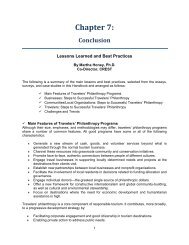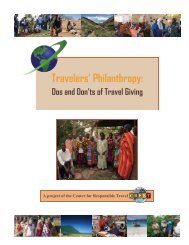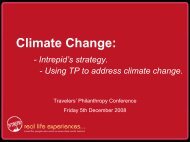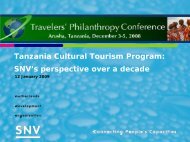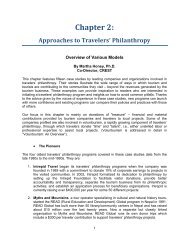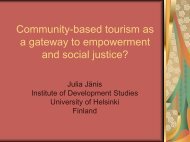Travelers' Philanthropy Handbook - Center for Responsible Travel
Travelers' Philanthropy Handbook - Center for Responsible Travel
Travelers' Philanthropy Handbook - Center for Responsible Travel
Create successful ePaper yourself
Turn your PDF publications into a flip-book with our unique Google optimized e-Paper software.
Box 2:Voluntourism in Meetings and EventsOne of the fastest growing areas within voluntourism is at events and meetings. According toFinancial and Insurance Meetings Magazine in 2009, incorporating service projects intomeetings is the “next big thing.” Industry organizations like the Professional ConventionManagement Association (PCMA) have incorporated “give back” activities into their annual andregional meetings such as “Network <strong>for</strong> the Needy” which encourages food donations to localcharities and a large volunteering activity.Although this is a relatively new area, practitioners and researchers have already begun toestablish best practices <strong>for</strong> the industry. While there is no agreed upon industry standard orcertification program available as yet, there are a number of resources available to guidevolunteer tourism practices.As voluntourism matures, more lessons learned have begun to emerge. Some of the mostimportant ones are described below:Partnerships: Voluntourism is sporadic in nature. Tourists come <strong>for</strong> a relatively short period oftime and then they leave. The needs of the VRO however are not sporadic but rather of an ongoingnature. There<strong>for</strong>e, it is key that organizations with an established record in the hostdestination continue the necessary work regardless of whether volunteer tourists come or not.This fosters continuity and maximizes impact <strong>for</strong> the destination. Failure to develop relationshipswith partners that understand the needs of the community and have an on-going presence willnot only hurt the cause in the long-run, it may also produce a less than satisfactory experience<strong>for</strong> the guest.Community Ownership: Volunteer projects must be “owned” by the local community. Touroperators and non-profit organizations that bring tourists to do projects that they believe to beimportant <strong>for</strong> a host community likely face failure. Experience has shown that the communitymust be a part (or all) of deciding what is needed <strong>for</strong> a project to continue, be successful, andhave an impact. Ideally, the host community would also be involved in the activity in some level.Educating the <strong>Travel</strong>er: Tourism is an invasive activity. Voluntourism allows guests and hoststo interact on a very personal level. It is important that visitors understand the impact they couldpotentially have on the host community. At times, even the best intentions can have negativeimpacts. For example, the donation of clothing is a common practice. However, the adoption ofa new style of clothing may have cultural impacts, fostering a transfer of traditions that was anunintended consequence of a simple gesture. There<strong>for</strong>e traveler education is imperative tominimizing potential negative impacts, as well as helping the traveler understand what toexpect.Per<strong>for</strong>mance Monitoring: Continually re-evaluating the volunteer program from theperspective of the VSO and VRO is essential to ensure that real needs are being met <strong>for</strong> thehost population and that the tourist benefit from the experience. Adjusting and changingprograms based on this evaluation will improve the long-term viability of the VRO and VSO.Business Development: Although VSOs and VROs may be <strong>for</strong>-profit, governmental or nonprofit,operations should take into account the financial viability of the activities. Benefits willcease to exist if the VSOs and VROs are not able to continue their work due to financialconstraints. There<strong>for</strong>e, programs must be managed with the goal of creating financialsustainability.103




